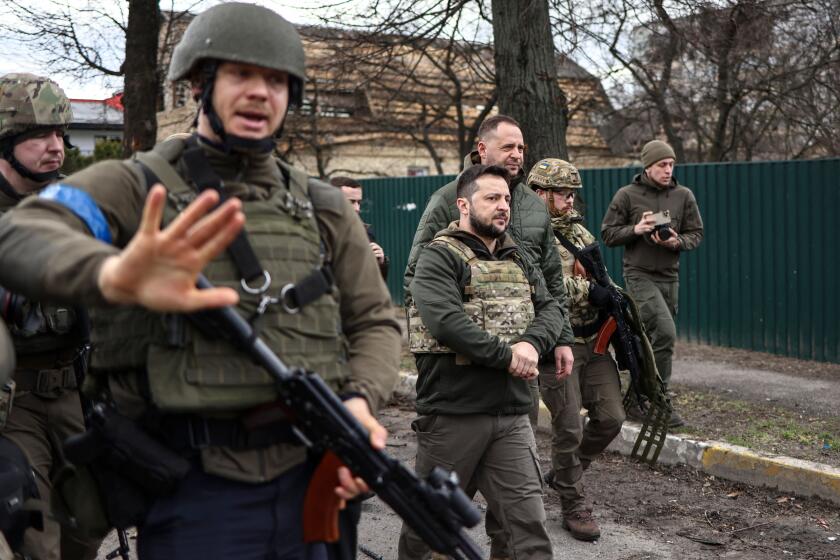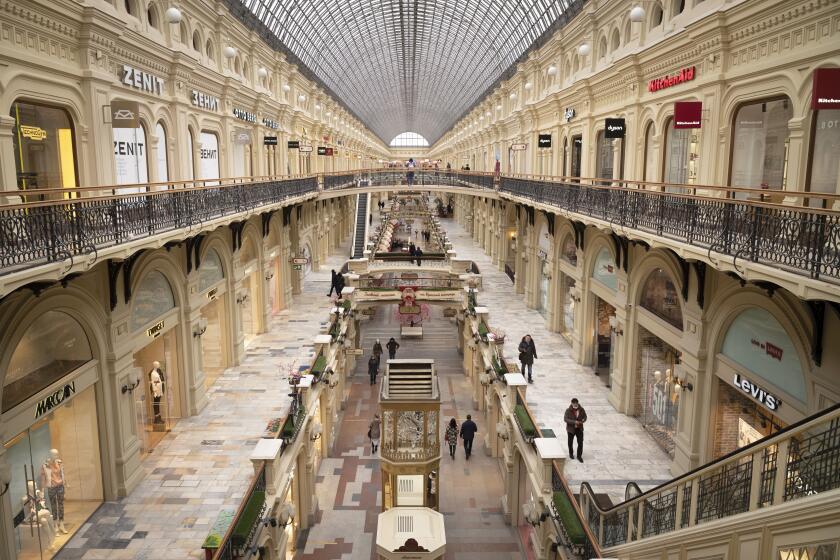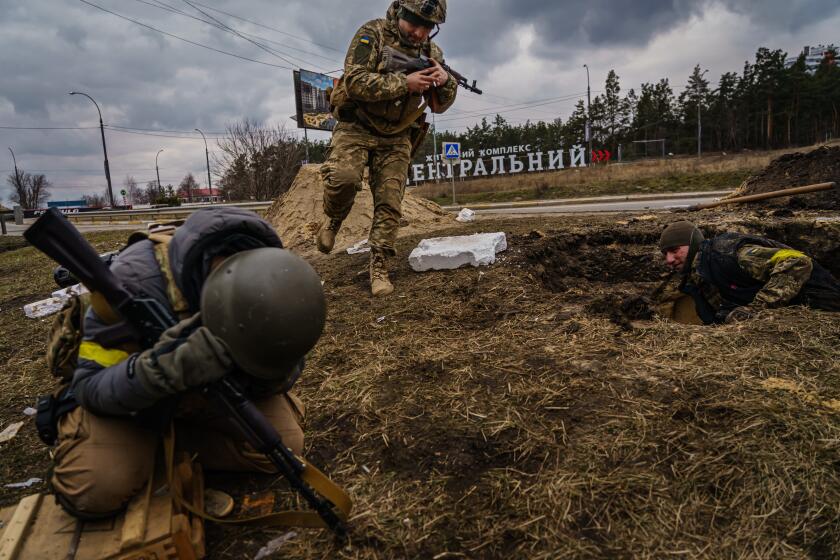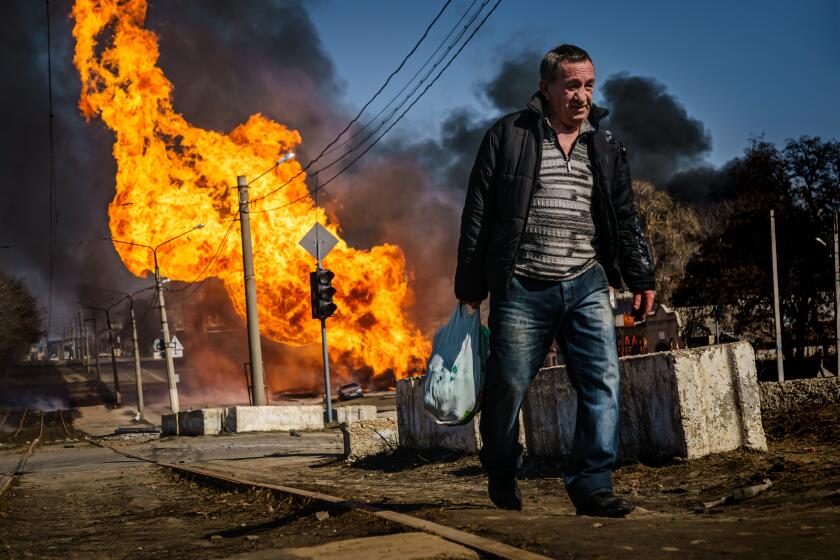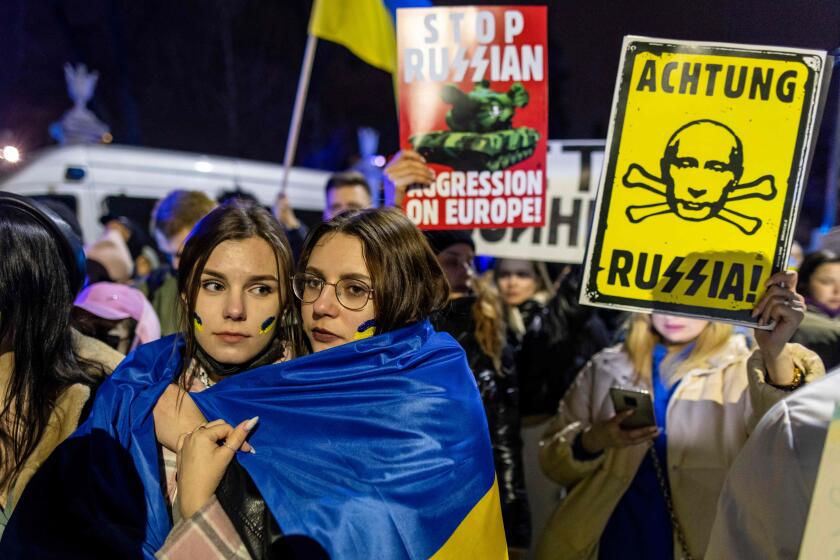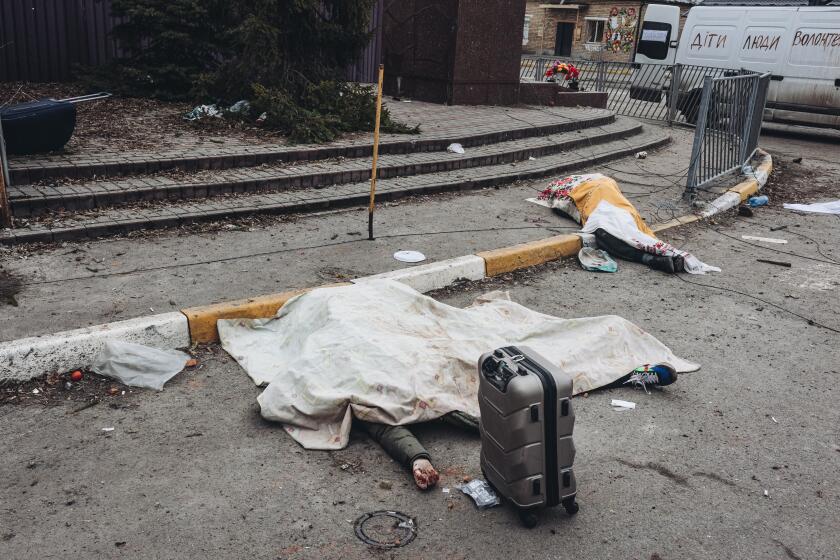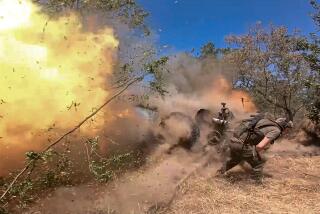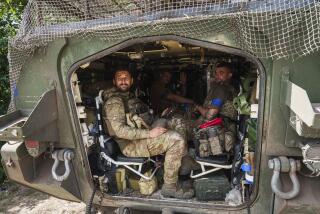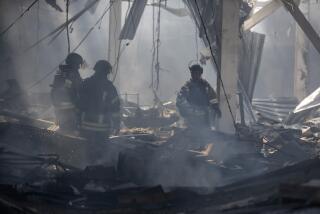Russian troops broaden their offensive across Ukraine
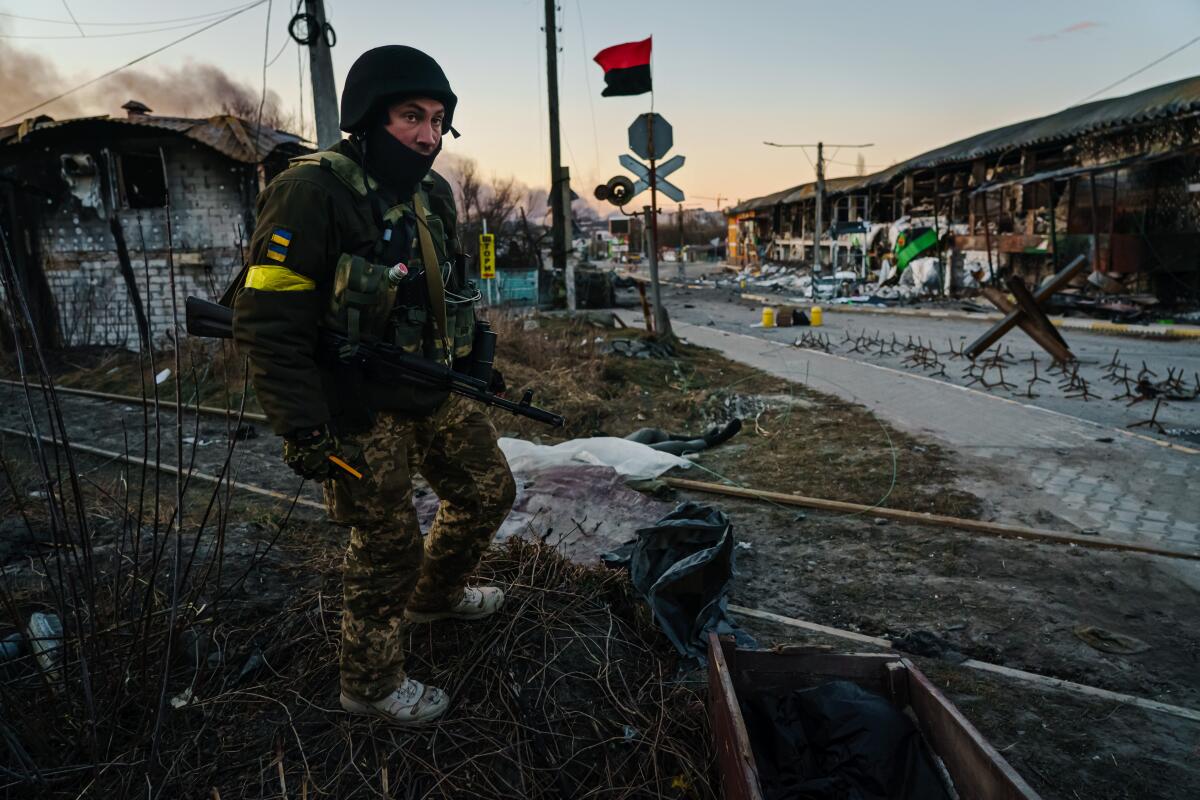
KYIV, Ukraine — Russian forces widened their bombardment of Ukraine on Friday, attacking more major cities, moving toward Kyiv and inching westward while also pounding targets farther from the front line.
The intensified assault came even as the United States insisted diplomacy still had a role in the conflict and as Moscow pressed its propaganda war at the United Nations, with the specter emerging of a Russian biological or chemical attack.
President Biden on Friday turned up economic pressure on Moscow, an “aggressor” that “must pay the price,” he said, revoking trade relations with the nation and banning Russian products such as diamonds and vodka. But Biden again refused Ukrainian pleas for a no-fly zone over Ukraine, which U.S. and NATO officials say would inevitably bring Russia and the United States into direct conflict and escalate the war.
“We will not fight a war against Russia in Ukraine,” Biden said at the White House. “Direct confrontation between NATO and Russia is World War III.”
A woman reacts as she stands in front of a house burning after being shelled in the city of Irpin.
The U.S. and its NATO allies instead have supplied Ukraine with tons of weaponry and beefed up forces on the North Atlantic Treaty Organization’s eastern flank, in countries such as Poland and Romania that border Ukraine.
Biden made the announcement after speaking again to Ukraine’s defiant and embattled president, Volodymyr Zelensky.
Early Friday, Russian warplanes conducted three airstrikes on Dnipro — Ukraine’s fourth-largest city, in the country’s southeast — hitting a kindergarten, an apartment building and a two-story shoe factory, according to Ukraine’s State Emergency Service. The factory was still burning more than two hours after the attack, and at least one person was killed, the emergency service said.
Those strikes followed a bombing run on the Lutsk military airfield in the northwest, the Interfax-Ukraine news agency said, quoting Yuriy Pohulyaiko, head of the military administration in the area. Pohulyaiko said two soldiers were killed and six others wounded.
Airstrikes also hit the airport in Ivano-Frankivsk in western Ukraine, said Mayor Ruslan Martsynkiv.
“The enemy has struck at Frankivsk. There were explosions at our airport. Remain calm, the relevant services are working,” Martsynkiv wrote on his official Facebook page, urging residents to leave the area and not to spread photos or videos of the explosions.
Russia’s attacks in western Ukraine bring the fighting closer to bordering NATO countries, where assaults could trigger a wider war involving the West.
As the war in Ukraine rages, ordinary Russians face a degree of international isolation not seen in decades. What will Putin do next?
In Washington, Pentagon spokesman John Kirby said Friday it was unclear whether the strikes marked a significant push west. “The vast, vast majority of their combat power is being spent in the east,” he said in a news briefing.
The capital, Kyiv, is at heightened risk, he added. Russian troops “are beginning to make more momentum on the ground toward Kyiv, particularly from the east,” he said.
“There’s Russian bombardment and shelling going on quite violently as we speak.”
Russian forces continued their intense bombardment of the southeastern city of Mariupol on Ukraine’s Black Sea coast, Mayor Vadym Boichenko said in a video message on Facebook. Mariupol was the site of the shelling and destruction this week of a maternity hospital, prompting some Western officials, including Vice President Kamala Harris, to call for a war crimes investigation.
“Two days of hell, Armageddon,” Boichenko said, adding that the Russians were using rockets and artillery on residential areas.
“Every 30 minutes, airplanes fly over the city of Mariupol, attack residential areas, kill the civilian population — the elderly, women, children,” he said.
Efforts to establish a humanitarian corridor to allow safe passage out for Mariupol’s civilians have repeatedly failed because of Russian fire, according to Ukrainian officials.
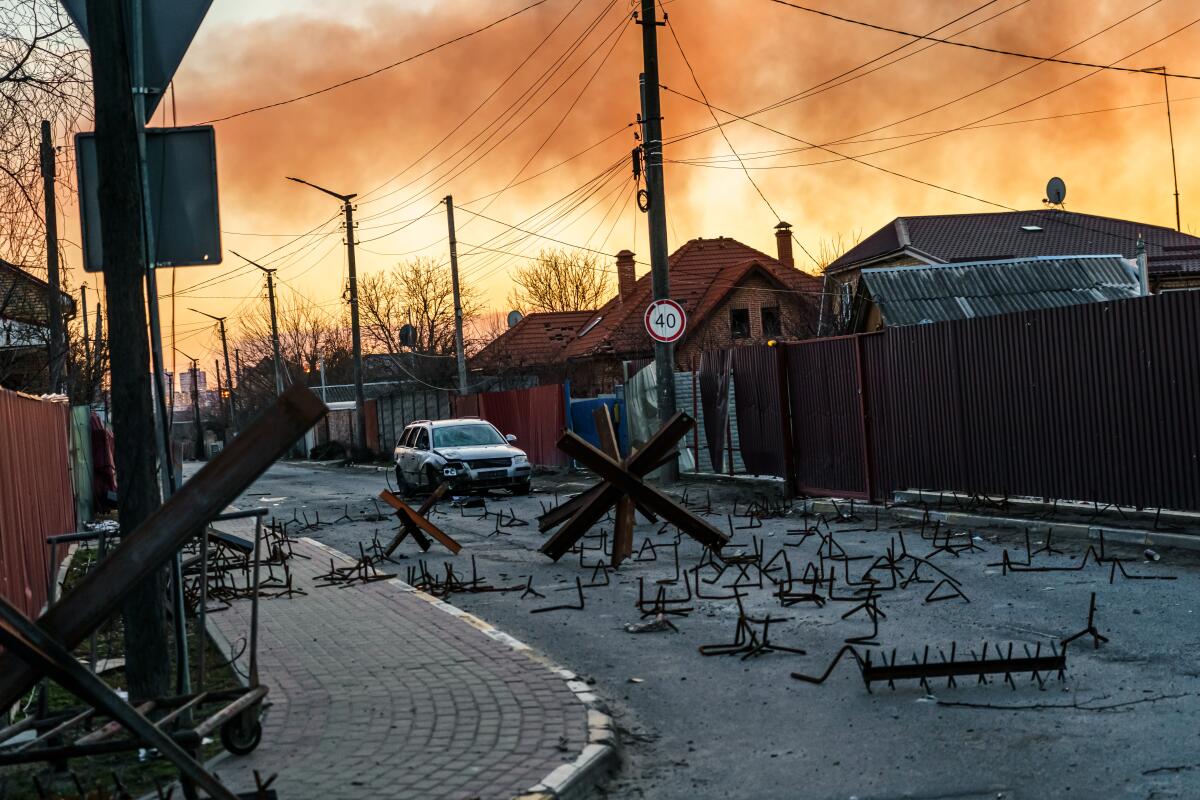
Despite the deadly risk of doing so, more than 2.5 million Ukrainians have now fled their country, the United Nations said. Most have gone to Poland, which has so far welcomed them but also is pleading for international aid in accommodating and processing the refugees.
The main prize for Russia remains Kyiv, where satellite photography showed that a massive armored convoy, long stalled north of the city, has begun to split up and move into villages and forests. Some analysts contend that the troops are shifting artillery into firing positions.
Kirby said he didn’t want to “make too much” of the satellite imagery, and he suggested the Russians could be moving into tree lines to avoid attacks from Ukrainian forces.
Russian troops appeared Friday to be locking down part of the expanse of villages and towns northeast of Kyiv. In the town of Pryluky, about 80 miles east of Kyiv and once home to Ukraine’s largest airfield in the Soviet era, Ukrainian soldiers were laying mines on a road into the city. Russian troops, they said, were about 30 miles northwest of the town.
Ukrainian troops in Irpin, on the outskirts of Kyiv, dig in as a long column of Russian tanks advances toward them. They vow to fight to the end.
The Ukrainian military’s top command said its troops halted Russian efforts to take the northern city of Chernihiv. Ukrainian troops recaptured the nearby town of Baklanova Muraviika, which Russian troops could use as a staging post to move toward Kyiv.
Russian forces are also blockading Kharkiv, the country’s second-largest city, and pushing their offensive in the south around Mykolaiv, Zaporizhzhia and Kryvyi Rih, the hometown of Zelensky.
Russian Defense Minister Sergei Shoigu said Friday that thousands of “volunteers” from all over the world, especially the Middle East, have asked to join the fight against Ukraine. Many are believed to be arriving from Syria, where Moscow long supported the brutal and ultimately successful campaign of President Bashar Assad to vanquish domestic opposition as well as the Islamic State terrorist group.
“We consider it right to respond positively to [the] requests, especially since these requests are not for money, but at the true desire of these people,” Shoigu said at a meeting of the Russian Security Council, according to the Russian state news agency RIA Novosti.
The Times’ Marcus Yam, no stranger to war photography, gives a first-person account from Ukraine.
Zelensky, who has been defiant in rallying his people, remained determined.
“It’s impossible to say how many days we will still need to free our land, but it is possible to say that we will do it,” he said in a video shot outdoors in Kyiv and released Friday.
He cited the escape of 7,144 Ukrainians who made it out of the country despite Russian attacks.
“And these are 7,144 reasons to try to organize evacuations for Ukrainians from the besieged cities tomorrow and the day after tomorrow,” Zelensky said.
Later, in another video message, he accused Russia of kidnapping the mayor of Melitopol, a city that Russian forces were swiftly occupying.
Russian strategy should be “equated with the actions of ISIS terrorists,” he said, referring to Islamic State. It is a “new stage of terror” in which the Russians are “trying to physically eliminate representatives of the legitimate local Ukrainian authorities.”
Russia also was granted a meeting Friday at the U.N. Security Council to discuss what it claims are “the military biological activities of the U.S. on the territory of Ukraine.” U.S. diplomats scoffed at the move, saying it was an attempt to “gaslight the world.”
Pentagon and State Department officials have expressed growing concern over Russia’s motives for disinformation campaigns.
“This is exactly the kind of false-flag effort we have warned Russia might initiate to justify a biological or chemical weapons attack,” said Olivia Dalton, a spokesperson for the U.S. delegation at the U.N.
The U.S. has flatly rejected Russian accusations that Ukraine is running chemical and biological labs with U.S. support. The Pentagon put out a long list of what it described as legitimate “peaceful and safe biological detection and diagnostic capabilities” that it has been working on with Ukraine since 2005. This includes the development of vaccines and methods to fight disease in livestock, the Pentagon said.
Asked about the possibility of a chemical or biological attack from Russia, Biden said: “Russia would pay a severe price if they used chemical weapons.”
And in another twist in the propaganda war, the Russian general prosecutor’s office on Friday petitioned a Russian court for Meta — Facebook’s parent company — to be counted as an extremist organization after the company said it would allow speech such as “death to the Russian invaders.”
“Such actions by the company’s management not only form an idea of the permissibility of terrorist activities, but are also aimed at inciting hatred and enmity towards the citizens of the Russian Federation,” the prosecutor’s office said, according to the official Russian news agency Tass.
The government of Russian President Vladimir Putin again floated the idea of negotiations with Ukraine despite several rounds of talks so far achieving next to nothing. Ukraine says that Russia will accept nothing less than its surrender. Ukraine is demanding a cease-fire.
Vice President Kamala Harris visits former Soviet satellites Poland and Romania to reassure them of U.S., NATO protection and support on refugees.
“No one rules out the possibility of a meeting between Putin and Zelensky,” Kremlin spokesman Dmitry Peskov said Friday.
At the same time, Peskov said that “first, delegations and ministers need to do their part of the work to make sure that the presidents don’t meet just for the sake of the process and a conversation but hold a meeting to achieve results.”
But the U.S. was highly skeptical. State Department spokesman Ned Price said Russia so far is engaging in a “pretense of diplomacy” with no genuine interest in negotiating.
“Putin could choose to cut his losses, extricate himself from this strategic morass by seeking to negotiate in good faith a diplomatic agreement with Ukraine,” Price said. Instead, “the Kremlin continues to spread outright lies,” such as claiming the bombing of the maternity hospital was “fake news.”
Tatiana Perebeinis, 43, and her children, Nikita, 18, and Alise, 9, were killed along with a volunteer who was helping them flee the war in Ukraine.
“This is from a government that is now using many measures to hide the truth from its own people,” Price said.
Harris, who wrapped up a trip to Warsaw on Friday, pledged an additional $53 million in humanitarian aid for Ukrainian refugees in Poland. She met with a small group of refugees Thursday.
“We are here to support you,” she told the group. “And you are not alone. And I know there’s so much about the experience that you’ve had that has made you feel alone.”
Polish President Andrzej Duda warned Harris that an international “refugee crisis” was soon going to explode into a “refugee disaster.”
And another looming disaster could hit food supplies worldwide because Ukraine and Russia are among the planet’s top exporters of grain, fertilizer and other agricultural commodities, the U.N.’s Food and Agriculture Organization said. The FAO projects that, if the war continues, the number of undernourished people in the world will increase by up to 13 million people by 2023.
Bulos reported from Kyiv and Wilkinson from Washington. Times staff writers Noah Bierman in Warsaw and Eli Stokols and Anumita Kaur in Washington contributed to this report.
More to Read
Sign up for Essential California
The most important California stories and recommendations in your inbox every morning.
You may occasionally receive promotional content from the Los Angeles Times.
